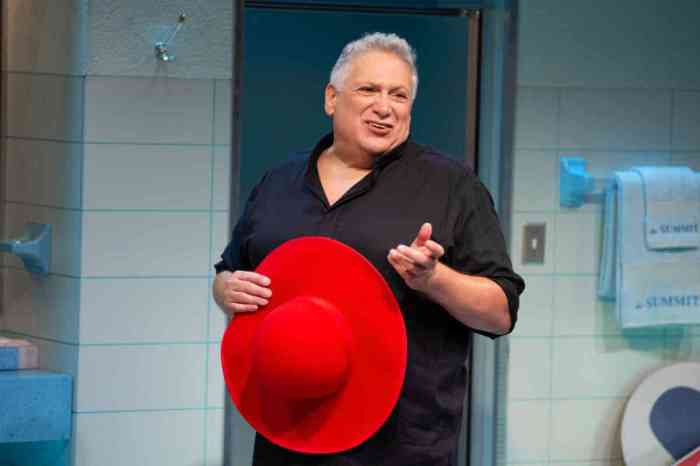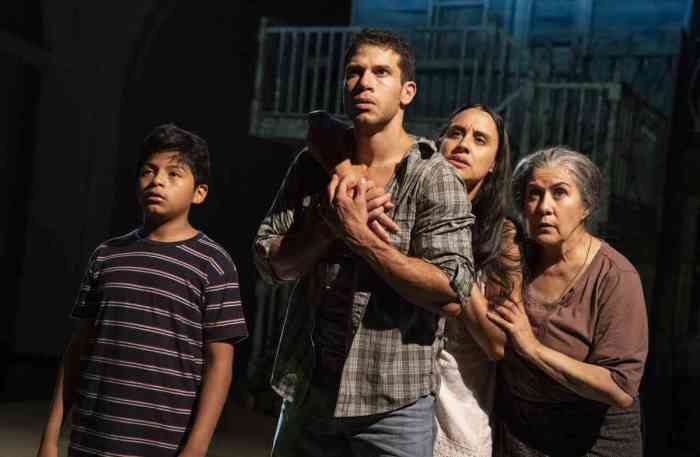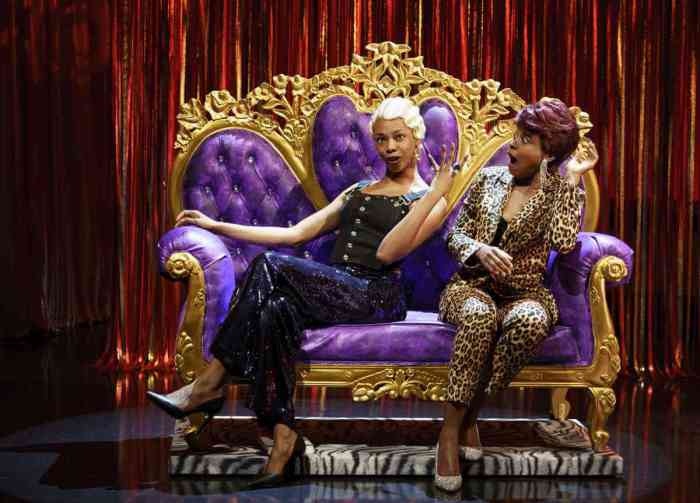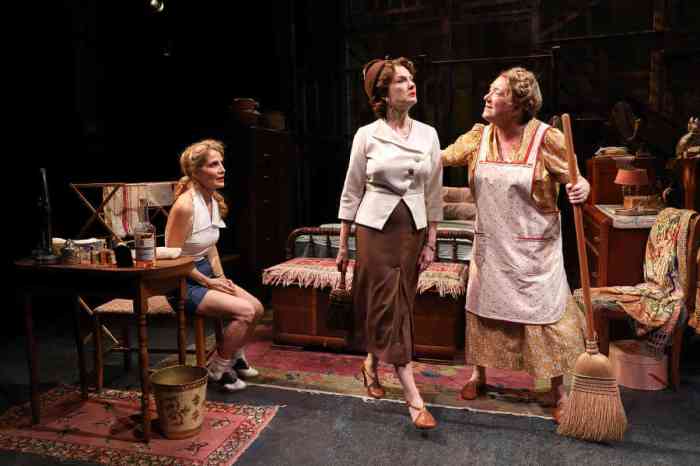Austin Pendleton must be the hardest working man in New York theater; he always seems to be either acting in or directing some production. This year is an especially busy one for him, and I was thrilled for the chance to sit down with him in the quiet lobby of the Signature Theatre and get the full 411 — past, present and future — from this true gentleman of the stage, whose eyes, indeed, entire being, brim over with intelligence and kindness. Walking down 42nd Street with him later, we were stopped by a handsome young Italian fellow who asked him for a selfie. Pendleton smilingly obliged and the tourist said, “Thank you, Mr. Larrabee!” addressing Pendleton by his character’s name in the 1972 film “What’s Up, Doc?” That title and 1992’s “My Cousin Vinnie” are the two films for which he is most recognized.
We first talked about “Wars of the Roses: Henry VI and Richard III,” which he adapted and direct and acts in for a limited engagement at the 124 Bank Street Theater through August 19.
“Matthew de Rogatis is playing Richard,” he said. “I slightly knew him as he had played Hamlet and was impressive. He came to me and said he wanted to play the part and I said, ‘Okay, but can we put together parts of other plays that had been written before, like part three of Henry VI? Because at the beginning of part three you get a really touching portrait of Richard in relation to his father, who then is horribly murdered. Richard is traumatized by that and there is nothing left for him but to get the crown and there’s all these people in the way, so he gets increasingly murderous. If we make them all one play, which is not as long as either one of them alone, you get a real arc of Richard III and how he gets turned into an evil person.’
“I am playing Henry VI, which is actually a small part, and next season, I will be in ‘Choir Boy,’ by Tarell Alvin McCraney, which we originally did five years ago at Manhattan Theatre Club in the little theater on 55th Street. Now, MTC has decided to do it in their Broadway space at the Samuel Friedman Theatre, and Tarell has been doing revisions, which I didn’t think it needed, but they’re very good.
“The play, directed by Trip Cullman, is set at a prep school for African-American boys. I am the only white person, a teacher, who marched with Martin Luther King in the ‘60s. Homosexuality is a big issue in the play, kind of set in the present day, and the hero, played by Jeremy Pope, is openly gay and sings in the choir. The choir is one of the great things about this school, and he has a spectacular voice, and a whole lot of conflict arises because of his sexuality.”
On top of those commitments, Pendleton just directed a revival of the play “The Saintliness of Margery Kemp,” written by John Wulpe in 1958, which was having its first preview the day of our interview.
“It stars Andrus Nichols of Bedlam Theater, who was the producers’ idea, and she is just wonderful. She plays the title role, an actual woman who in the 14th century believed she was a mystic and left her husband and children to go on a pilgrimage, which you can imagine was not usually done back then. She dictated her experiences, which were turned into a book and some of the speeches in the play come directly from that. She was deluded, but also a very smart, interesting person. Wulpe is 90 and had presented me with about four of his plays, all of which I liked, and I chose this one to do, because this is not like any other play I have ever come across.
“It was a catastrophe when it was done originally, with Frannie Sternhagen who is a brilliant actress and perfect for the part, so it must have been that everything else was bad. The playwright still can’t mention the reviews of the time without choking up. A couple of people at our invited dress said it was like a female ‘Peer Gynt’ and how wonderful that it is a journey play about a woman, for a change.”
Mentioning his upcoming 80th birthday, Pendleton said, “You have to do two things I have learned in this career: you have to care a lot, and not care at all, at the same time.
“This business is so volatile, ruled by whim and opinion. One day you’re hot and then you’re cold as a slab of beef in the freezer. There was a point in my career when I did a season in Brooklyn, and all my reviews were terrible, and all of a sudden I couldn’t get auditions for anything. I would get work as a director but as an actor it was over.
“People became aware that I was available so I would play Shakespeare sometimes in church lofts and basements and I taught, which was how I made a living, and directing jobs. My acting was just done in showcases, and its wrong to call them fallback positions, because they’re really interesting to do. If you get some real setbacks as an actor and you don’t go onstage for a while, and then you do, it’s too important for the wrong reasons. So I kind of learned that through a series of disasters. I teach this in my classes, tell stories about when directors said really harsh things to me. My students say, ‘Well, that’s terrible!’ And I say, ‘No it’s not. They’re trying to put on a show, and if you’re not pulling your weight they’re going to get mad at you and say so — and they have a right to.
In his long career, Pendleton has worked with seemingly everyone, on stage and screen, and I kept throwing names at him, and here’s what I learned.
Elizabeth Taylor, whom he directed in her stage debut in 1981 in “The Little Foxes”: “I was in that one as an actor before, directed by Mike Nichols, with Anne Bancroft, so when I was asked to direct it 14 years later, I knew this brilliant play very, very well. Taylor was great, I mean she had real presence on stage. You didn’t have to worry about that. She had stage sophistication and she was a great colleague with everybody, including me. She was one of the people.
“We got so much attention, and would have press conferences in every town we went to, the only show I’ve ever been involved with that did that, like it was the most important event in the world! I kept wanting to say, ‘It’s a really good play and they’re all good actors.’
“Yes, Taylor’s eyes were really purple; she was beautiful, in every way, actually. And it was the last thing Maureen Stapleton ever did on stage. With her big scene at the top of Act Three, I had staged it like they always do it, for her big revelations. She said, ‘This is not the way this happens. When somebody is making a confession about drinking, they don’t sit still.’
“So I said, ‘Okay, you stage it.’ And she came up with this incredible staging where everybody was still and she kept moving around, sometimes behind people. Walter Kerr, who was the critic of the era, hated my direction but wrote that she had somehow triumphed in her great scene over the hideous staging of the director. I thought, ‘First of all it’s brilliant staging, and I can say that because I didn’t do it. You’re missing the whole point of the staging.’ That was brilliant, and in my whole directing life, I think I’ve staged maybe three scenes that were that good.”
Lillian Hellman and Mike Nichols: “Mike came to DC when we were trying out ‘Little Foxes’ and we had breakfast the next morning. I miss Lillian — she was very difficult, like a lot of playwrights but the thing that distinguished her was she was very funny and she was also capable of being very amused by other people.
“Mike said, ‘The thing about Lillian is that she’s usually right but she usually sounds like she’s wrong.’ She would state things so dogmatically you’d think, ’Oh, come on!’ You would have to listen past the way she said things. She was a very sexy babe, and I got to know her quite well. She was as hot as a pistol — it was her brain – but she looked awful. God was kind, though, because she had to spend a lot of time in LA because of her emphysema, so she wasn’t there for rehearsals. When Mike directed ‘The Little Foxes,’ he finally just asked her to leave.
“Lillian hated Anne Bancroft [playing Regina Giddens] and was after Mike all the time to fire her. But she was very good in it, and she saved me. I was going down for the count and Mike was so frustrated with me, with just cause. I thought, ‘I’m gonna be taken into a mailroom and murdered!’
“Anne noticed this and said, ‘You look unhappy.’ I said, ‘Well, Mike says he’s tried everything.’ ‘He says shit like that, don’t worry,’ she said and watched what I was doing. She said, ‘I figured out last night what he doesn’t like. It’s the way you move. You have to move differently. Your character is stupid and he knows he’s stupid. People who feel like that don’t lead with their head, they lead with their crotch. Now come into my dressing room and walk back and forth the way I say.’
“I did it, and instantly Mike was excited, and Anne said, ‘Don’t you tell him I said this.’ Many years later, I did tell him. I was fairly certain I was going to be fired and there she was, playing Regina, and she takes the time to think of this, the kindness and also the smarts!”
Tony Kushner and Meryl Streep: “I was in that production of ‘Mother Courage’ in Central Park, directed by George Wolfe, with Meryl Streep, and it was just as exciting as you’d think. One night my daughter and a friend of hers came and were backstage. Meryl was wonderful to them, and then we left and were walking from the backstage of the Delacorte Theater through the park. Almost everyone had already gone, but out from behind a tree pops Tony Kushner!
“I hadn’t even been aware that he was there that night and he said, ‘Tonight’s performance meant more to me than any of anything I’ve ever written! Brilliant!’ That was a Sunday night, so when I returned for the performance on Tuesday night, the first thing I said to George Wolfe was, ‘Hey, Tony jumped out from behind a tree, and said never has any production of his been so good. How good is this?
“George said, ‘Then why did I get 22 single-spaced pages of notes from him?’
“I said, ‘Well, if he hadn’t liked it, you would have gotten 55 pages.’ We were three performances away from press night and it’s a very hard play. Meryl handled it by saying, “Okay, let’s just take this a note at a time and figure out which ones we can actually do!’ She was so intelligently relaxed about it, whereas a lot of actors I know would have said, ‘I’m sorry, I can’t take this on!’
“Tony writes with such density that you have to spend time trying to figure out a note, like ‘I think he just means faster!’ He’s so adorable. He would have even beaten down Ethel Merman, he’s just so full of thoughts, but that’s why his writing is so good, too.”
Billy Wilder, his director on “The Front Page”: “Adorable — he treated me like a prince because I was kind of a wreck, and he was lovely. I think that Jack [Lemmon] and Walter [Matthau] were having a rough time on that movie. I never sensed any tension in our scenes, but they’d confide, ‘He’s driving me crazy,’ and both swore they were never going to work with him again, which of course they did, they’re not fools.
“I’d been in big movies before, but not in a while, and for some reason I was nervous about it. Billy picked up on this the first day and addressed it but not directly, like asking me point blank, ‘Why are you nervous?’ I would do a scene and he would just calm me down by saying, ‘Ok, we go again,’ and he would put his hand on my shoulder and not say a word, walk back, and call ‘Action!’ I teach directing down at HB Studio and realize that sometimes the best direction is to just shut up and put a hand on their shoulder.”
WARS OF THE ROSES: HENRY VI AND RICHARD III | 124 Bank Street Theater, 124 Bank St. btwn. Greenwich & Washington Sts. | Aug. 1-19: Wed.-Sat. at 7 p.m.; Sat. at 2 p.m.; Sun. at 3 p.m. | $25 at brownpapertickets.com/event/3396975
THE SAINTLINESS OF MARGERY KEMPE | The Duke on 42nd Street, 229 W. 42nd St. | Through Aug. 26: Tue.-Thu. at 7:30 p.m.; Fri, Sat 8 p.m.; Sun. at 7 p.m.; Sat.-Sun. at 2:30 p.m. | $55-$92 at tickets.dukeon42.org or 646-223-3010 | Two hrs., 20 mins., with intermission


































